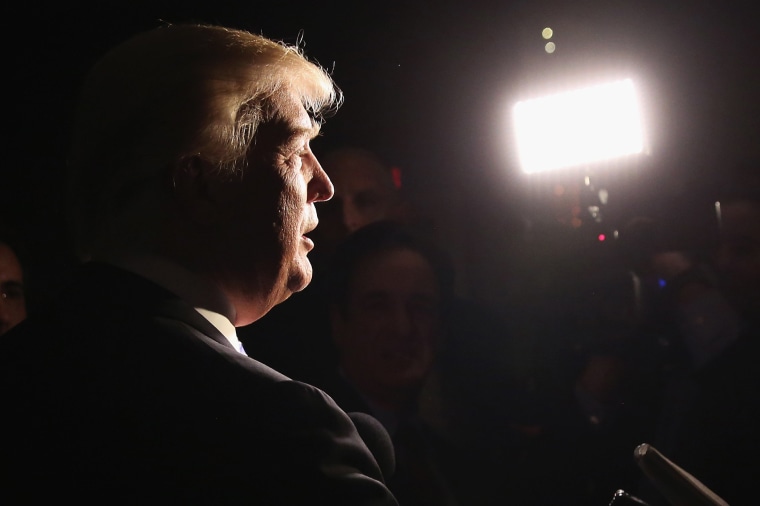Donald Trump can't seem to decide whether he's for raising taxes on the wealthy or cutting them, based on interviews he's given over the last two days. It's the latest and perhaps most eye-popping example of Trump's tendency to edit or adjust his policy proposals, depending on the moment.
The presumptive Republican presidential nominee appeared on CNN Monday to refute his own assertion -- made in interviews on NBC's "Meet the Press" and ABC's "This Week" Sunday -- that the wealthy would likely see a tax hike if he is elected president.
RELATED: First Read: Why Trump's flip-flop on taxes matters
"I said that I may have to increase on the wealthy – I’m not going to allow it to be increased on the middle class – now, if I increase it on the wealthy, that means they’re still going to be paying less than they’re paying now. I’m not increasing it from this point, I’m talking about increasing from my tax proposal," Trump told CNN, insisting that overall there would be a tax decrease for the rich and middle class alike.
Besides being confusing, it's a flip-flop on top of a pile of flip-flops: Trump started saying the wealthy needed to pay more taxes last summer, but then put forward a detailed tax plan last September that offered up huge cuts for the rich.
Trump's comments to CNN came amid a backlash to his interviews Sunday, when Trump suggested the rich would pay more in taxes if he were president. He tried to dance the line on the issue in a tweet posted Monday morning.
On ABC, Trump said taxes on the wealthy would “go up a little bit” in negotiations and that, as a wealthy person himself, he is personally OK with higher taxes.
"I am willing to pay more. And you know what? Wealthy are willing to pay more. We've had a very good run,” he said.
Trump told NBC's Chuck Todd something similar: It's all negotiable.
"Under my proposal, it's the biggest tax cut by far, of any candidate by far. But I'm not under the illusion that that's going to pass. They're going to come to me. They're going to want to raise it for the rich. Frankly, they're going to want to raise it for the rich more than anybody else," Trump said. "But the middle class has to be protected. The rich is probably going to end up paying more. And business might have to pay a little bit more. But we're giving a massive business tax cut."
Pressed on that last, confusing point -- that business might pay more but also get a tax cut -- Trump said he meant more than his existing proposal: "Excuse me. I said they might have to pay a little bit more than my proposal."
He didn't offer up such a qualification on the tax plan on the wealthy. And on Thursday on CNBC, Trump said he wasn't a "huge fan" of the fact that his tax plan primarily boosts the uber wealthy.
"I am so much more into the middle class, who have just been absolutely forgotten in our country. You know, when you put out a tax plan, you are going to start negotiating," he told CNBC. "I can see that going up, to be honest with you. I know I am talking to your folks but in all fairness we are cutting. During a negotiation I could see that going up."
But in April, he was asked if he believed in raising taxes on the wealthy.
"I do, I do, including myself. I do," he said in a "TODAY" town hall.
Now, he says, his entire plan is simply a starting point for negotiations.
RELATED: Trump on taxes for rich: 'By the time it's negotiated, they'll go up'
Trump’s platform has emerged -- like everything else in his campaign -- piecemeal in a continuous stream of media appearances. His tendency toward incoherent rhetoric and changing answers isn't a small part of his campaign: it's central to it. Trump routinely refuses to offer specifics, arguing that he'll use unpredictability and vague proposals to cut better deals. He embraces his own changing answers as evidence of growth.
While his tax plan is just one of the major issues Trump has flip-flopped on since announcing his bid less than a year ago, it’s the one that’s most at odds with the Republican Party. It's been an article of faith in the GOP that taxes on everyone -- especially higher earners -- should be cut, and nearly all the party’s elected officials have signed pledges vowing not to vote to hike taxes on anyone. It's that hard-line stance that Trump seems to be running up against, as he works to cast himself as a populist while working to keep his party happy.
In his Sunday interviews, Trump denied making any changes to his tax policy plan -- the one that’s still on his website and proposes massive tax cuts for the wealthy and modest ones for the middle class – but even when Trump settles on a tax plan, it's unclear how he'll pay for it.
